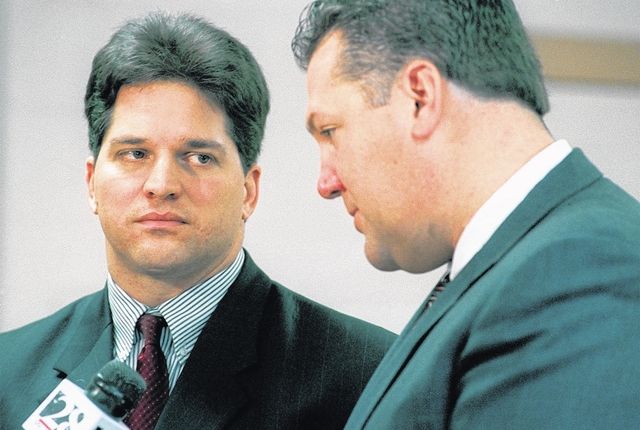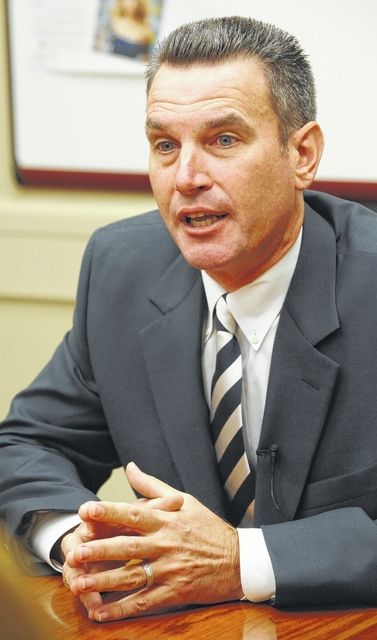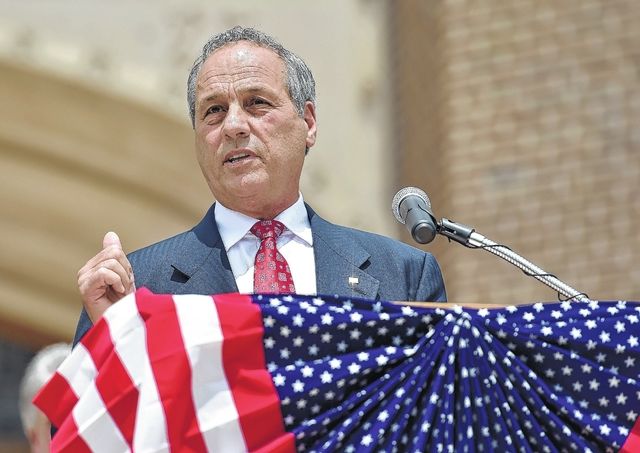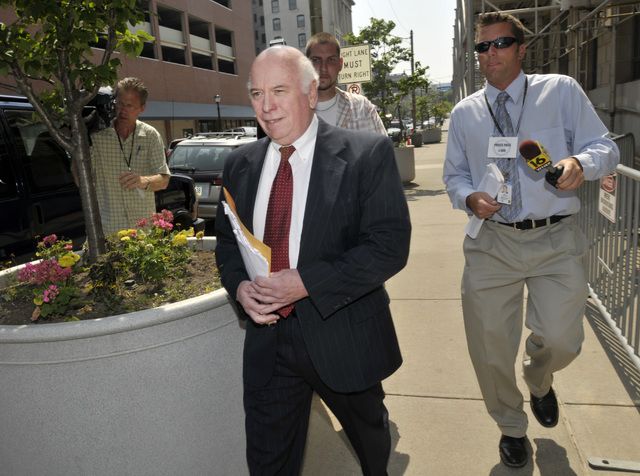Click here to subscribe today or Login.
The allegations were sensational: A prominent Luzerne County law firm bribing the court administrator to assign its potentially bonanza environmental contamination suit to a select judge who was friendly with the law firm’s leader.
When Gregory R. Zappala first made the bold claims in a 2014 racketeering lawsuit filed against former local attorney Robert Powell, the accusations prompted denials and professions of innocence from both the judge and law firm.
But the fervor quickly died to silence. The case-fixing allegation was never dissected and weighed in open court before Zappala and Powell ended their dueling lawsuits against each other last July.
Now, attempts are underway to revive the Powell Law Group’s Avoca environmental litigation — the suit at the heart of Zappala’s case-fixing allegation — in the Luzerne County Court of Common Pleas, raising questions about whether there was any truth to the unresolved claim.
Zappala’s allegations didn’t surface in the original Avoca proceedings because his racketeering lawsuit was filed after the environmental litigation went dormant in county court in 2009, when claims of the 4,400 plaintiffs shifted to a New York-based bankruptcy case involving the former Kerr-McGee Corp.
Kerr-McGee and other defendants said in court they figured the Luzerne County suit was dead because the Avoca plaintiffs had accepted bankruptcy compensation for diseases, illnesses and death allegedly caused by contamination from the company’s railroad tie manufacturing operation in Avoca, which operated from 1956 to 1996.
When the Avoca plaintiffs filed paperwork to reopen the Luzerne County suit last September, Kerr-McGee and related entities swiftly and successfully blocked the action in the New York court, arguing the plaintiffs can’t return to the well a second time for compensation.
However, the matter remains in limbo because the Avoca plaintiffs filed an appeal that is still pending before the U.S. Court of Appeals based in New York City.
The allegations
Zappala’s racketeering lawsuit alleges Powell and the Powell Law Group “bribed” then-court administrator William Sharkey to assign the firm’s 2005 Avoca litigation to then-county judges Michael Toole or Peter Paul Olszewski.
Powell allegedly promised Sharkey a “ghost” job with the detention center he co-owned with Zappala, as well as a contract for a company owned by Sharkey’s son to clean both the detention center and county courthouse.
The case went to Olszewski.
The suit infers Olszewski’s alleged drinking with Powell at his law firm and trip to a Florida condominium tied to Powell had a bearing on the judge’s rulings that allowed the Avoca claims to become part of a bankruptcy case that is resulting in a more than $100 million payout to Powell Law and other lawyers.
A Times Leader review of around 200 non-sealed filings in Zappala’s racketeering suit shows Powell and the other defendants never got into the meat of their defense before the settlement.
The defendants said in an October 2014 filing that the plaintiffs are “unlikely to succeed on the merits” of the racketeering claims. Another filing by Powell and other defendants characterized the racketeering claims as “baseless.”
Also named as defendants in Zappala’s suit were the Powell Law Group, Powell’s wife, their company Vision Holdings, LLC, and former Luzerne County prothonotary Jill Moran, an attorney who recently identified herself as having served as the sole managing director and president of Powell Law Group since Aug. 31, 2009. Zappala’s consortium of companies were also named as plaintiffs in the suit.
The court administrator
When the racketeering defendants sought documentation on the Sharkey allegation during discovery, Zappala’s response pointed to a July 2014 declaration from Michael Marsicano.
Marsicano, a former Hazleton mayor who is running against U.S. Rep. Lou Barletta this year, said in his signed declaration he had been a “close friend” of Powell’s.
Powell was city solicitor when Marsicano was mayor. Powell, Marsicano and Zappala also were principals in Gladstone Partners, which launched a Hazleton area cargo airport project plan that never materialized.
According to the declaration:
Marsicano, a pilot, said he took aerial photographs of the Kerr-McGee operation for Powell and sometimes spoke to Powell about the Avoca litigation.
Marsicano said Powell once told him he had called Sharkey and asked him to assign the Kerr-McGee case to either Olszewski or Toole.
“In return, Mr. Powell promised Mr. Sharkey a ghost job for life at the PA Child Care juvenile center; promised to give Mr. Sharkey’s son (who owned a commercial cleaning business) a contract to clean the PA Child Care juvenile center; and promised to arrange for a contract for Sharkey’s son to clean the Luzerne County Courthouse,” Marsicano wrote.
Marsicano said he occasionally visited a room set up as a bar at Powell’s law office.
“When I was there, Judge (Michael) Conahan, Judge Olszewski, Mr. Sharkey and Nick Callen (who was Judge Conahan’s tipstaff) were also there,” Marsicano wrote.
Marsicano recently declined comment on the Zappala suit.
Sharkey and his son, William T. Sharkey Jr., a former West Hazleton councilman, could not be reached for comment through listed phone numbers or work contacts.
The elder Sharkey, a former longtime court administrator, was arrested in 2009 as part of the county corruption probe and sentenced to 10 months in prison for stealing more than $70,000 in illegal gambling proceeds that were supposed to be turned over to the county.
Months before settling the racketeering suit, Zappala filed court paperwork disclosing his plans to add both Sharkeys and the cleaning business — Commercial Maintenance Associates — as defendants in the racketeering suit, although that never happened.
State corporation paperwork lists William T. Sharkey as the owner of Commercial Maintenance, which was created in August 2003.
The unsealed court paperwork did not disclose if either Sharkey or Commercial Maintenance received payments from the detention center.
William T. Sharkey Jr., doing business as Commercial Maintenance, is listed as a past county vendor in the county’s financial software system, but officials said there’s no readily accessible way to determine the dollar amount of any past payments to the company for county work. Historical county spending data was not loaded into New World when the county started switching over to the new software in 2013.
The judge
When Zappala’s accusations were made public in the summer of 2014, Olszewski issued a statement saying the claims involving him were a “malicious attack” on his “character as a judge.”
“All of the judicial rulings in the referenced case, as in every case I’ve ever been involved in, were made pursuant to the rule of law and legal authority,” Olszewski said at the time. The racketeering filing “demonstrates that anyone can allege anything in a civil lawsuit,” he added.
In his lawsuit, Zappala said that Olszewski denied a motion for summary judgment that would have ended the Avoca litigation. The then-judge also approved an agreement sending cases to arbitration and entered orders confirming arbitration awards.
The suit says Olszewski “entered orders crucial to Robert Powell, Moran and Powell Law Group’s success” in the Avoca litigation.
Contacted for this story, Olszewski said has since secured a private attorney and painstakingly reconstructed all court transcripts and documents in the case to prove the Avoca case was fairly handled.
Olszewski pointed to Kerr-McGee’s request for summary judgement throwing out the Avoca litigation before it got off the ground.
Instead of favoring Powell Law by immediately granting its request to deny Kerr-McGee’s motion for summary judgement, Olszewski said he suggested the appointment of a third-party special master to hear and review arguments from both sides and provide a recommendation.
Both sides agreed to the idea, he said.
Summary judgement special master Scott C. Gartley, who previously worked as an assistant district attorney when Olszewski was county district attorney, issued a 17-page report in August 2005 recommending denial of summary judgement.
According to Gartley’s report:
Kerr-McGee and related entities argued the statute of limitations had run out for the claims raised by the Avoca plaintiffs. The plaintiffs maintained their claims were timely filed and made allegations about fraudulent concealment by the defendants.
The special master said it would be “premature” to grant Kerr McGee’s request because “it simply cannot be said that Kerr-McGee’s entitlement to summary judgement is clear and free from doubt.” Summary judgement is “not proper” if there is a genuine issue of material fact that could be established by additional discovery or expert reports, he said.
Gartley listed some examples of “genuine issues of material fact” that were still unresolved, including the onset of physical complaints and injuries by plaintiffs, the efforts plaintiffs made to learn about their injuries and the cause and whether any statements made by Kerr-McGee or its agents caused plaintiffs to “relax their vigilance or deviate from their right of inquiry.”
Kerr-McGee also has argued the plaintiffs did not provide enough documentation establishing dates of injury, but Gartley said Kerr-McGee did not exercise its right to file preliminary objections challenging the “specificity or legal sufficiency” of the Avoca complaints.
The special master recommended the summary judgement denial “without prejudice,” which meant Kerr-McGee could refile the request after further discovery regarding the statute of limitations and other issues.
Olszewski said he adopted all of the special master’s recommendations and described Gartley’s report as a “scholarly opinion that is exceptionally well done and supported the decision.”
“So the big thrust of what the lawyers in the racketeering suit said was that I wrongfully denied the motion for summary judgement and that is 100 percent untrue,” Olszewski said. “I denied it without prejudice because it was premature.”
Olszewski said his denial of summary judgement without prejudice was “consistent” with rulings on similar Kerr-McGee cases throughout the country and noted Kerr-McGee did not file a second request for summary judgement as discovery proceeded.
“Many of those courts denied the motion for summary judgement, just like I did, on the same legal issues,” he said. “If the defendants were unhappy, they could have appealed it, but they didn’t. What I did was fair and impartial and legally correct.”
The orders Olszewski later entered confirming arbitration awards stemmed from a decision made in outside binding arbitration, he said.
Olszewski said the plaintiffs and defendants decided on their own, without his advance knowledge or input, to attempt to resolve their litigation through binding arbitration instead of proceeding to trial. The parties selected — again, he said, without his input — Russell M. Nigro as the arbitrator.
“With arbitration it’s off my plate,” Olszewski said.
The Avoca plaintiffs filed an emergency petition in November 2008 asking Olszewski to approve judgements forcing payment of claims Nigro had awarded in the binding arbitration.
Olszewski said he held an oral argument and did not grant all the items requested by Powell Law. Attorneys for both sides agreed with the content of his final order, he said.
He also noted he had appointed — with the agreement of both sides — attorney Brian J. Cali as special master to handle the protracted and voluminous discovery issues in the Avoca litigation. Defendants and plaintiffs equally split the cost of special masters.
Olszewski said he was “wronged big time” by the racketeering allegation and hasn’t ruled out his own legal action.
“This was totally out of line and unfair to me. I’m still considering my options,” he said.
Questionable ties alleged
Zappala’s lawsuit said the assignment of the Avoca case to Olszewski occurred “at or near the time” Olszewski drank at the bar inside Powell Law.
Olszewski also flew on a private jet for a visit to a condominium in Jupiter, Florida, in 2005, courtesy of Powell, the racketeering suit said.
The suit points to a 2009 published newspaper report in which the Hazleton businessman who owned the jet said the trip to Florida was arranged and paid for by Powell.
Olszewski has said he believed the flight had been arranged by then-judge Michael Conahan and said he paid Conahan $400 for the flight for himself.
Powell said he did not arrange for the 2005 Olszewski plane trip, according to a discovery-related filing in the racketeering suit.
Zappala’s suit alleged Powell contributed $590,000 — most of the Florida condominium’s cost — through prepaid rent and dock rentals and was listed in the condominium association’s records as a permanent guest resident of the condominium “to mask his ownership.”
An anonymous photo of Olszewski at the condominium with Conahan and convicted drug dealer Ronald Bellitiere, a friend of Conahan, was sent to media in 2009 and was cited by many as the reason Olszewski lost his bid for retention and a second 10-year term on the county bench.
Falling out
The racketeering suit maintained that Powell and the other defendants stole millions from two detention centers he and Powell had co-owned to fund the Avoca litigation and other expenses.
“Robert Powell’s plan is like an old movie plot where a vampire keeps his victim alive in order to drink her blood forever,” the suit said.
The brother of state attorney general candidate and current Allegheny County District Attorney Stephen A. Zappala Jr., Gregory Zappala said in a court filing that he was an investment banker active in municipal bond work and that he had met Powell through that work.
Powell approached him in 1999 about the idea of building a juvenile facility in Northeastern Pennsylvania, and Zappala decided, after completing due diligence, that it was a “good opportunity,” the lawsuit said.
The lawsuit said Zappala told Powell they “were done” in May 2008 when he first learned through a newspaper report about a Wright Township townhouse project business relationship involving Powell, Moran, Powell Law, Conahan and former county judge Mark Ciavarella.
Powell was sentenced to 18 months in federal prison for failing to report illegal activity by Ciavarella and Conahan involving kickbacks for decisions benefiting the detention centers.
The two former judges are still serving federal prison sentences they received for their roles in the scheme — 28 years for Ciavarella and 17.5 years for Conahan.
At the time Zappala’s racketeering lawsuit was filed, Powell had his own lawsuit pending against Zappala, arguing his former partner treated his distress as an “opportunity” to shortchange him as Powell relinquished ownership stake in the detention centers.
Both suits were closed out in the confidential settlement.
Recent filings in other court actions involving Powell and Powell Law say the bankruptcy pot for Avoca plaintiffs was $314.2 million at the end of 2015, which puts Powell Law’s 40-percent contingency share at $125.7 million.
The amount going to Powell is unclear due to confidential agreements the firm has with others, including attorneys now handling the case.
Powell, who now lives in a mansion in Palm Beach Gardens, Florida, entered into a settlement agreement in a civil lawsuit filed by juveniles and parents in connection with the so-called “Kids for Cash” corruption scandal, requiring him to pay $4.75 million and possibly up to $2.5 million more if his net worth exceeds $4.75 million by the end of this year.









